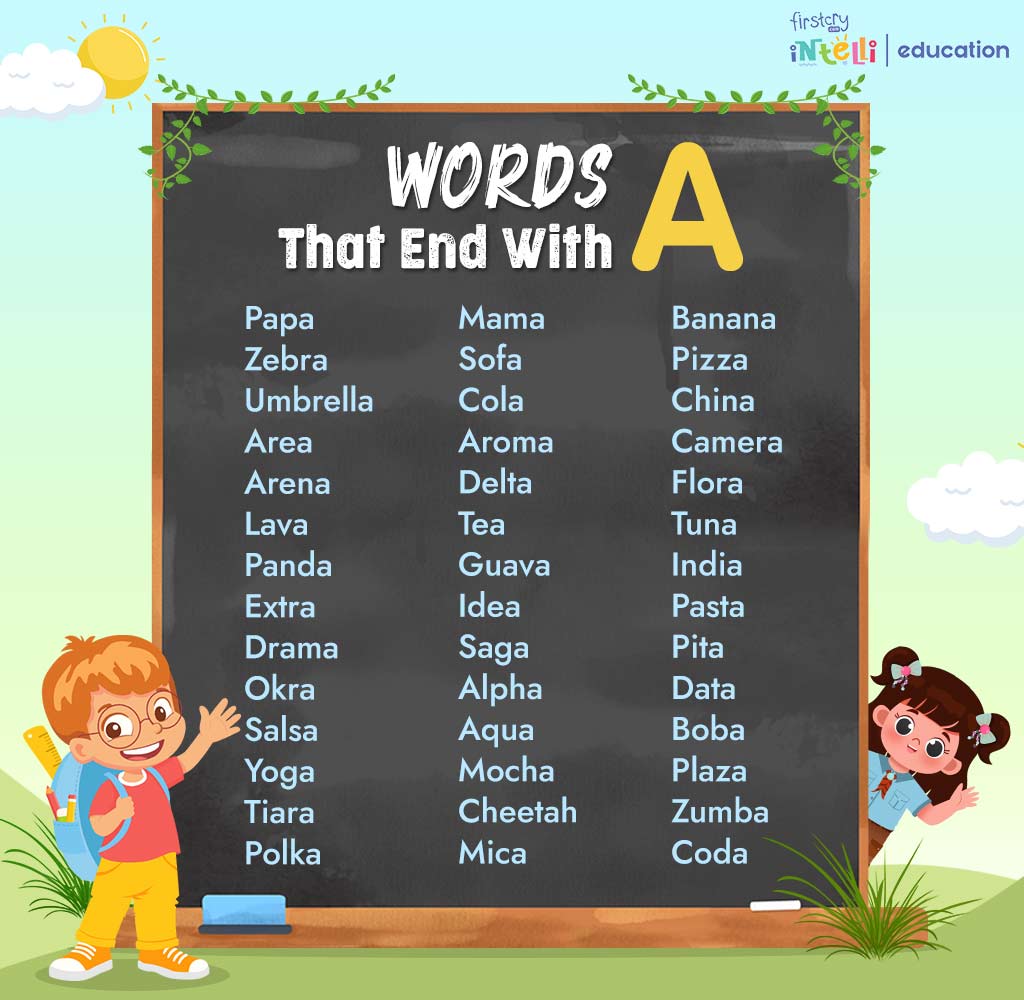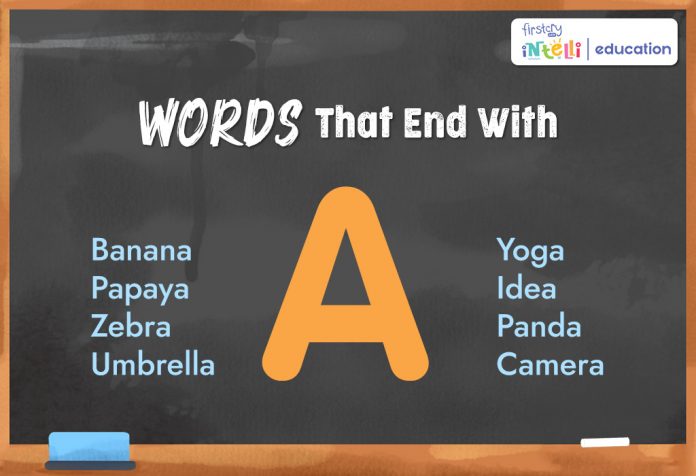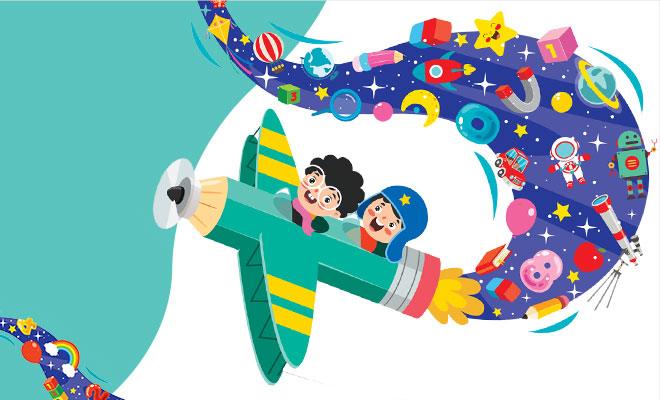Last Updated on August 13, 2025
Building a strong vocabulary is a fundamental step in every child’s early education journey. One effective way to nurture language skills is by introducing children to word groups that share similar endings. Focusing on words that end with the letter ‘A’ can be both engaging and educational for young learners. This approach not only helps children recognise letter patterns but also supports their reading, spelling, and pronunciation skills. In this article, we present a carefully curated list of words that end with ‘A’ for preschoolers and kids, tailored to support their learning and enjoyment. Whether used at home or in the classroom, these words are perfect for language games, spelling exercises, and lively reading sessions. By exploring these user-friendly words that end in A,’ parents and teachers can inspire children’s curiosity for language, laying a strong foundation for literacy skills that will benefit them for years to come.
Thank you for reading this post, don't forget to subscribe!
List Of Common Words That End With A
Discover useful words with ‘A’ at the end to help children build their vocabulary. These familiar examples are perfect for enhancing spelling and reading skills in primary classes.
| Papa | Mama | Banana |
| Zebra | Sofa | Pizza |
| Umbrella | Cola | China |
| Area | Aroma | Camera |
| Arena | Delta | Flora |
| Lava | Tea | Tuna |
| Panda | Guava | India |
| Extra | Idea | Pasta |
| Drama | Saga | Pita |
| Okra | Toga | Data |
| Salsa | Yoda | Boba |
| Yoga | Mocha | Plaza |
| Tiara | Cheetah | Alpaca |
| Polka | Mica | Coda |
3 Letter Words Ending In A
Discover simple examples of a three-letter word ending with A to help young learners improve their spelling and vocabulary. These words are perfect for children in classes 1–3 as they begin their language journey:
| Tea | Sea | Pea |
| Spa | Era | Boa |
| Pia | Ana | Lea |
| Ava | Lua | Oca |
| Moa | Ora | Ska |
- Tea – A hot drink made by adding boiling water to dried tea leaves.
- Sea – The large body of salty water that covers much of the Earth’s surface.
- Pea – A small, round green vegetable that grows in a pod.
- Spa – A place people visit to relax and enjoy water treatments or massages.
- Era – A period of time marked by particular events or characteristics.
- Boa – A large snake, or a long, fluffy scarf.
- Pia – A girl’s name, not commonly used as a regular word.
- Ana – A girl’s name, not widely used as an English word.
- Lea – A grassy open field or meadow.
- Lua – A girl’s name or a word in other languages, but not common in English.
- Ava – A girl’s name, not typically used as a vocabulary word.
- Oca – A type of root vegetable, similar to a small potato.
- Moa – A large, flightless bird from New Zealand that is now extinct.
- Ora – Means “hour” in other languages; mainly used as a girl’s name in English.
- Ska – A lively style of music that started in Jamaica.
4 Letter Words That End With A
Explore common and simple four-letter words ending in A to help children build their vocabulary. These words are perfect for young learners in classes 1 to 3:
| Sofa | Diva | Tuna |
| Lava | Cola | Aura |
| Idea | Mica | Yoga |
| Alga | Ocha | Pita |
- Sofa – A comfortable seat for two or more people, often found in living rooms.
- Diva – A famous female singer, or a woman who acts as if she is very special.
- Tuna – A large fish found in the sea; also, the name of its meat used in food.
- Lava – Hot, melted rock that comes out of a volcano.
- Cola – A sweet, fizzy soft drink, usually brown in colour.
- Aura – A feeling or atmosphere that seems to surround a person or place.
- Idea – A thought, suggestion, or plan in someone’s mind.
- Mica – A shiny, layered mineral used in things like paint and makeup.
- Yoga – Exercises from India that use stretching and breathing to help people feel calm and healthy.
- Alga – A simple plant that grows in water, often green and looking like slimy moss.
- Ocha – The Japanese word for tea.
- Pita – A type of flat, round bread that can be split and filled with food.
5 Letter Words That End With A
Boost your child’s vocabulary with easy examples of a five-letter word ending in A. These simple words are perfect for kids in classes 1 to 3 to use in speaking and writing.
| Zebra | Flora | Panda |
| Delta | Pizza | Guava |
| Arena | Maria | Limpa |
| Salsa | Extra | Llama |
- Zebra – An animal like a horse with black and white stripes.
- Flora – All the plants that grow in a particular place.
- Panda – A large, black and white bear that lives in China and eats bamboo.
- Delta – A flat area where a river splits into smaller streams before going into the sea.
- Pizza – A round, flat food with a bread base, tomato sauce, and cheese, often with other toppings.
- Guava – A sweet tropical fruit with green or yellow skin and pink or white inside.
- Arena – A large, open space where people watch sports, shows, or other events.
- Maria – A girl’s name; in science, it also means dark, flat areas on the moon.
- Limpa – A type of sweet rye bread from Sweden.
- Salsa – A spicy sauce made from tomatoes, onions, and peppers; also a lively dance from Latin America.
- Extra – Something added beyond what is usual or expected.
- Llama – An animal from South America known for its long neck and thick fur.
6 Letter Words That End In A
Help your child expand their vocabulary with these easy words that end with the letter A. These six-letter examples are ideal for kids in classes 1 to 3 to use in reading and writing.
| Alpaca | Banana | Camera |
| Marina | Samosa | Agenda |
| Pajama | Selena | Panada |
| Maraca | Jatoba | Fascia |
- Alpaca – An animal from South America with soft, fluffy wool.
- Banana – A long, yellow fruit that is sweet inside.
- Camera – A device used for taking photos.
- Marina – A place where boats are kept.
- Samosa – A tasty snack with a pastry shell and a filling inside.
- Agenda – A list of things to do or talk about.
- Pajama – Clothes you wear to sleep in at night.
- Selena – A girl’s name (could be skipped if you want only nouns).
- Panada – A dish made with bread and milk or soup; can also refer to a young panda (for fun in class).
- Maraca – A musical instrument you shake to make noise.
- Jatoba – A type of tree found in South America (might be less common but is a real word).
- Fascia – A thin layer in the body that covers muscles.
Nouns That End With A
Discover these short words that end with A, all of which are nouns, to help young learners build a strong and practical vocabulary. These examples are ideal for children in classes 1 to 3, making everyday English more engaging.
| Lava | Koala | Mesa |
| Okra | Puma | Tiara |
| Hyena | Tuba | Manta |
| Panda | Flora | Viola |
| Stella | Extra | Sepia |
- Lava – Hot, melted rock that comes out of a volcano.
- Koala – A grey, furry animal from Australia that lives in trees and eats leaves.
- Mesa – A flat-topped hill with steep sides, often found in deserts.
- Okra – A green vegetable with small seeds inside, sometimes called “lady’s finger.”
- Puma – A large wild cat, also called a cougar or mountain lion.
- Tiara – A small, fancy crown often worn by girls or princesses.
- Hyena – A wild animal found in Africa, known for its loud, laugh-like sound.
- Tuba – A very large brass musical instrument that plays deep, low notes.
- Manta – A very large type of ray (a fish) that lives in the sea.
- Panda – A large, black and white animal from China that eats bamboo.
- Flora – All the plants and flowers that grow in a particular place.
- Viola – A musical instrument that looks like a big violin and makes a warm, rich sound.
- Stella – A girl’s name; in Latin, it means “star.”
- Extra – Something more than what is usual or expected.
- Sepia – A reddish-brown colour, or ink made from cuttlefish used in old drawings.
Verbs Ending With A
Discover English words ending in A that can be used as action words during fun activities, helping children learn movement and rhythm. Although rare, these verbs are often used in games, dances, or exercise in classes 1 to 3.
| Salsa | Hula | Rumba |
| Samba | Polka | Zumba |
| Yoga | Cha-cha | Macarena |
- Salsa – A lively Latin American dance; sometimes used to mean “to dance salsa.”
- Hula – A traditional Hawaiian dance where you move your hips and hands.
- Rumba – A rhythmic dance from Cuba; used to mean “to dance the rumba.”
- Samba – A fast, happy dance from Brazil; sometimes used as “to dance samba.”
- Polka – A cheerful dance from Eastern Europe with hopping steps; can mean “to dance the polka.”
- Zumba – A workout that mixes dance and exercise, often done in fitness classes.
- Yoga – Stretches and poses that help you relax and get stronger; often used as “to do yoga.”
- Cha-cha – A quick, lively dance from Cuba; “to cha-cha” means to do this dance.
- Macarena – A fun dance where you move your arms and hips to a catchy song.
Adjective Ends With A
Help children expand their vocabulary with these describing words that end with ‘A’. These simple adjectives are ideal for children in classes 1 to 3 who are learning to describe people, places, and things.
| Extra | Mega | Alpha |
| Aqua | Gamma | Beta |
| Mocha | Supra | Palea |
- Extra – More than usual or needed; in addition (“We have extra cake”).
- Mega – Very big or great (“She built a mega tower”).
- Alpha – The first or best; also means first in a group (“He is the alpha dog”).
- Aqua – Relating to water or having a light blue-green colour (“She wore an aqua dress”).
- Gamma – The third in a series or group, often used in science (“Gamma rays” or “gamma test”).
- Beta – The second in a series or group (“Beta version” means the second version).
- Mocha – Having a chocolate and coffee colour, or tasting like coffee and chocolate.
- Supra – Above or over; higher (“Supraorbital” means above the eye, but “supra” is sometimes used to mean very high or extra).
- Palea – A pale or light colour (used in botany, but “palea” can mean pale in some poetic uses).
Adverb that Ends with A
Encourage children to explore how things are done with these words that end with letter A. These adverbs are suitable for kids in classes 1 to 3 and help make sentences more interesting.
| Vice versa | Extra | Circa |
- Vice versa – An adverbial phrase meaning “the other way around.”
- Extra – (informal) Sometimes used to mean “especially” before adjectives (e.g., “extra careful”), but not standard as an adverb in British English.
- Circa – Used as an adverb meaning “about” when referring to dates (e.g., “circa 1900”); from Latin, not a general-use adverb.
Words That End With A Chart
View the Chart below to help children visualise and remember useful vocabulary that ends with ‘A’. This chart is a handy tool for learners in classes 1–3 to explore words that share a common ending in a fun and organised way.

FAQs
1. Why Is It Useful For Kids To Learn Words Ending With A?
Learning words that end with ‘A’ helps children spot patterns in spelling and pronunciation, making it easier to decode unfamiliar words. It also enriches vocabulary, aids reading comprehension, and allows kids to recognise and use a wide variety of nouns, adjectives, and other word types in their writing and speech.
2. What Is The Importance Of Word Endings In Early Learning?
Understanding word endings helps children improve their spelling, syllable recognition, and pronunciation. Recognising patterns—such as words ending with ‘A’—enables kids to decode, predict, and spell new words, thus boosting reading fluency and expanding their vocabulary.
3. How Can Teachers Use Words Ending With A In Classrooms?
Teachers can introduce words ending with “A” through spelling games, word sorting, reading passages, vocabulary charts, and phonics activities. These practices encourage discussion, boost word recall, and make lessons interactive and engaging for young learners.
4. Which Food Words End With A?
There are several food-related words ending with A, such as pizza, cola, guava, papaya, okra, pasta, pita, and samosa. Introducing food vocabulary can engage students through everyday experiences and cultural discussions, making word learning relatable and memorable.
Learning words that end with A is a fun way for children to recognise spelling patterns and build a richer vocabulary. By practising these words, young learners can boost their confidence in reading, writing, and everyday communication.











